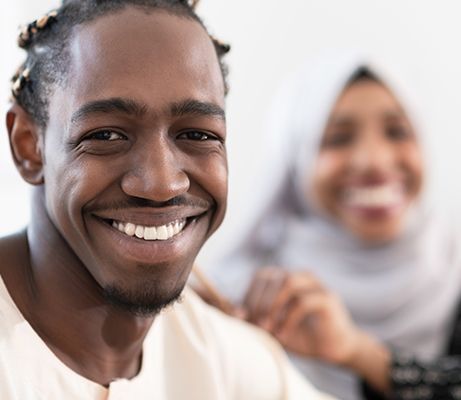Creating an Equitable and Inclusive Environment for Muslim Students at Connecticut State Community College
A Guide for Faculty and Staff
This guide was prepared to foster inclusive and equitable learning environments for Muslim students and to provide culturally appropriate services to Muslim students. Note: These guidelines outline general Islamic beliefs and practices. Individual application of these observances may vary.

What is Islam?
Islam is a monotheistic (one God) religion. It is an Abrahamic faith; it shares a heritage with Judaism and Christianity. The word “Islam” is derived from the Arabic word “peace.” Islam means “to submit [to God].”
Articles of Faith in Islam
- The One God
- The Angels (e.g., Archangel Gabriel)
- The Revelations/Books/Scriptures (Torah, Psalms, Gospel, and Qur’ān)
- The Prophets/Messengers of God (including but not limited to Adam, Noah, Abraham, Ishmael, Isaac, Jacob, Joseph, Moses, David, Solomon, Jonah, Zechariah, Jesus son of Mary, and Muḥammad, the last Prophet (peace be upon them))
- The Day of Judgement
- The Decree of God (i.e., predestination)
Five Pillars of Islam
- Declaration of Faith (Shahādah), which is “I testify that there is no god except God and that Muḥammad is His Messenger.”
- Prayer (Ṣalāh)
- Fasting (Ṣawm)
- Charity (Zakāh)
- Pilgrimage (Ḥajj)
Learn About the Muslim Faith
- Prayer
- Holidays
- Pilgrimage
- Dress Code
- Cross-Gender Interaction
- Dietary Restrictions
- Social Events
- Personal Hygiene
- Islamic Finance
Daily Prayer
Muslims are required to pray five times a day—before sunrise, around noon, mid-afternoon, at sunset, and at night. Before prayer, Muslims are required to wash their hands, mouth, nose, face, arms, ears, and feet with clean water. This is called Wuḍūʾ. Each prayer takes about 5-10 minutes to perform. Prayer may be performed in any quiet and clean place. During prayer, Muslims stand, sit, bow, and prostrate to God, facing Mecca. They are fully engaged and cannot respond to phone calls or conversations with the exception of emergencies. Others should not walk in front of or interrupt Muslims during prayer.
Friday Congregational Prayer
Muslim men are required (optional for Muslim women) to attend Friday congregational prayer called Jumu‘ah. (Friday congregational prayer is to Muslims what Sunday service is to Christians.) It generally takes place at a Mosque (Masjid) during the noontime prayer and includes a sermon. The duration of Jumu’ah is 45-90 minutes.
Ramaḍān and Eid al-Fitr
Ramaḍān is the ninth month of the Islamic lunar calendar (Hijrī) during which Muslims are required to fast from break-of-dawn to sunset. Fasting is intended to help teach Muslims self-restraint from eating and drinking, among other activities. It is also a time to empathize with those who are poor and hungry and to promote good manners. Fasting becomes an obligation when a boy or girl reaches puberty. Certain Muslims are exempt from fasting (e.g., travelers, pregnant women, and ill persons). Fasting does not mean that Muslims cease to work or study, although they may be fatigued and sleep-deprived during Ramaḍān. Eid al-Fitr, one of the two Islamic holidays, marks the end of Ramaḍān. (Eid al-Fitr means “Festival of Breaking the Fast.”) Muslim students may take time off from school to celebrate Eid al-Fitr. There should be no undue penalty for this religious obligation.
Eid al-Adha
Eid al-Adha (i) commemorates Prophet Abraham’s willingness to sacrifice his son (peace be upon them) in obedience to God and (ii) marks the end of the annual Islamic pilgrimage (Ḥajj) to Mecca. (Eid al-Adha means “Festival of the Sacrifice.”) Muslim students may take time off from school to celebrate Eid al-Adha. There should be no undue penalty for this religious obligation.
During the two Islamic holidays described above, Muslims greet each other by saying “Eid Mubarak,” which means “Blessed Festival,” and “Eid Kareem,” which means “Generous Festival.”
Muslims are obligated to make a spiritual journey or pilgrimage (Ḥajj) to Mecca at least once in their lifetime, if they are able to do so. Performing the rituals of Ḥajj may take five days (travel durations vary) during the last month (Dhul Ḥijjah) of the Islamic lunar calendar (Hijrī).
Islam commands Muslims to behave and dress modestly, especially when a boy or girl reaches puberty. There are a number of ways in which Muslims express such teachings. The most notable attire are as follows:
- Muslim women often wear a headscarf called Ḥijāb.
- Muslim women sometimes wear a face covering called Niqāb.
- Muslim men sometimes wear a small round cap called Kufi.
- Muslim men and women sometimes wear long tunics or robes.
These articles of clothing should not be prohibited in any dress code policies.
The human body is regarded as sacred (i.e., a gift from God) in Islam; therefore, certain social measures are taken to protect it. Below are select norms among Muslims:
- Most Muslims do not give hugs to or physically embrace unrelated persons of the opposite sex.
- Some Muslims shake hands with unrelated persons of the opposite sex; others view it as prohibited. Muslims may place their right hand over their heart and greet you instead. Tip: Wait until a Muslim extends his or her hand to you first. Otherwise, do not shake his or her hand.
- Muslims may or may not co-mingle with or sit or stand in close proximity to unrelated persons of the opposite sex. Tip: Let them choose. Don’t take it personal.
- Some Muslim men and women may not make direct eye contact with unrelated persons of the opposite sex.
The Qur’ān prohibits the consumption of alcohol, pork, and pork byproducts (e.g., gelatin). Muslims can eat herbivories; not carnivores. Many Muslims follow standards of slaughter and preparation of meat and poultry called Ḥalāl. (Ḥalāl is to Muslims what kosher is to Jews.) Tip: Choose a vegetarian option when catering to Muslims.
Some Muslims are reluctant to take part in social gatherings or events at which alcohol is served (e.g., Happy Hour). These students should not be penalized for not participating in such convenings.
Muslims are required to wash their private parts with clean water after using the bathroom. This is called Istinja’. If a bidet is unavailable, they may use a water vessel or bottle to do so.
Charging or paying interest is prohibited in Islam. Muslims may or may not accept interest-bearing student loan debt. Scholarships, grants, work-study, full payments, and payment installment plans with no interest are acceptable forms of funding.

Frequently Asked Questions (FAQ)
A person who practices Islam is a Muslim. They could be any race, ethnicity or nationality.
Muslims follow Islam as a religion. They comprise diverse cultures and languages.
Arabs could be Jewish, Christian, Muslim, Druze, etc. They have a shared culture and language.
Islam Around the World
- Islam is the world’s second-largest religion (approximately 1.8 billion Muslims in 2015).
- Arab Muslims are a minority of the global Muslim population.
- The largest Muslim-majority country is Indonesia:
-
- Indonesia
- Pakistan
- India
- Bangladesh
- Nigeria
- Islam is a global religion with followers all over the world.
Source: Pew Research Center
Muslims in America
- In 2017, there were approximately 3.45 million Muslims in America (1% of the U.S. population).
- Muslim Americans are one of the most racially diverse religious groups in the U.S. split as:
- 25% Black or African American
- 24% White
- 18% Asian
- 18% Arab
- 7% Multiple Races
- 5% Hispanic/Latine
Source: Pew Research Center
Muslims in Connecticut
Approximately 375 in 100,000 of the CT population (3,552,821) are Muslims (2021).
Source: https://worldpopulationreview.com/state-rankings/muslim-population-by-state
Thank you to the CT State Muslim and Arab Affinity Group for the information provided on this page.